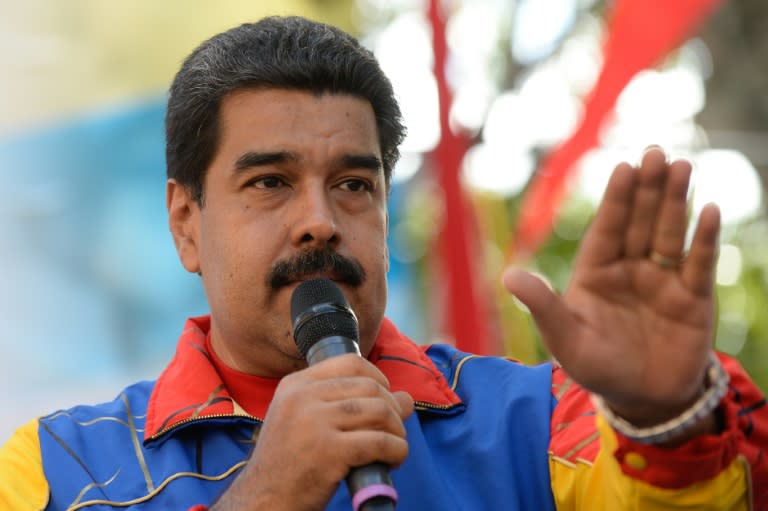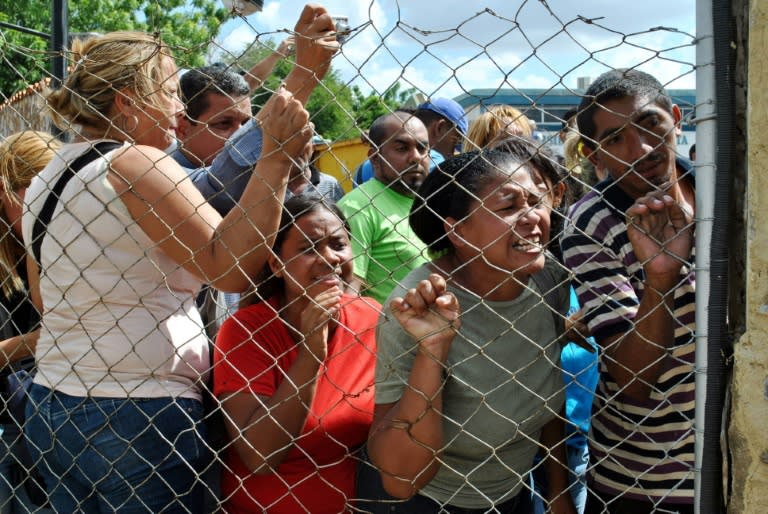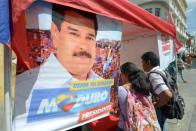Killing ramps up fears of Venezuela poll violence
Venezuelan President Nicolas Maduro said the fatal shooting of an opposition leader appeared to be a gangland score-settling, dismissing claims it was politically motivated ahead of elections. An attacker shot Luis Manuel Diaz dead on Wednesday evening in the central Guarico region at a campaign rally for the December 6 legislative elections, party officials said, ratcheting up fears that violence could erupt in the lead-up to the polls. The event was also attended by Lilian Tintori, the wife of a jailed opposition leader and a high-profile critic of Maduro. "They want to kill me," Tintori told a news conference later. "I hold Nicolas Maduro directly responsible." The European Union expressed concern about rising violence linked to the elections. "Yesterday's assassination of Mr Luis Manuel Diaz, the regional secretary of the Accion Democratica party, marks a further deterioration of an already tense situation in the run up to the parliamentary elections on 6 December 2015," the EU said in a statement. It called for a swift investigation and said those responsible must be brought to justice. Polls have indicated Maduro's socialist government could lose its majority in the National Assembly in next month's vote, potentially weakening his grip on power. Maduro has warned that if the opposition wins, his side is "politically and militarily prepared to deal with it" and would "take to the streets." Diaz was regional coordinator of the Democratic Action party, part of an opposition coalition against Maduro, though Diaz was not running for office. The United States condemned the killing, calling it the "deadliest of several recent attacks and acts of intimidation" against the opposition. Observers have warned the elections could spark unrest in the Latin American nation of 30 million people, already wracked by violence and an economic crisis with many families short of basic supplies. Maduro said authorities were investigating the "regrettable" killing and "the interior ministry has evidence that suggests it was a contract killing to settle a score between rival gangs." In a speech to supporters, he rejected a claim by the chairman of Democratic Action, Henry Ramos Allup, that the shooter was a member of an armed gang linked to the ruling United Socialist Party of Venezuela (PSUV). "Forensic investigations and testimonies from people who were there show that is totally false and is a reckless accusation," he said. Tintori's husband Leopoldo Lopez is in prison for incitement to violence in 2014 anti-government protests, though a fugitive prosecutor in the case has cast doubt on his conviction. That unrest left 43 people dead, according to the government. - 'Sowing hatred' - The Union of South American Nations (UNASUR) condemned Wednesday's killing and rejected "all forms of violence that could affect the normal development of the electoral process." The 12-country regional bloc, which is sending observers to monitor the elections, in a statement called on authorities to carry out "a thorough investigation into this reprehensible act." In the past two weeks, Venezuela's opposition has reported assaults and harassment against its leaders, including former presidential candidate Henrique Capriles, who said he was attacked by ruling-party supporters. The opposition Democratic Unity Roundtable (MUD) coalition said: "The violent preaching from the highest levels of government is responsible for sowing hatred." It called on international authorities such as the European Union and the Vatican to urge the Venezuelan government to openly reject violence. Venezuelans will elect 167 deputies to their single-chamber National Assembly when they vote next month. Opinion polls indicate that the opposition is poised to win control of the body for the first time since Maduro's mentor, late leftist firebrand Hugo Chavez, came to power in 1999. Venezuela's oil-rich economy has suffered from a plunge in crude prices and runaway inflation, which have fueled violent crime and political tension. Venezuela has the second-highest murder rate in the world after Honduras: 54 killings per 100,000 inhabitants in 2012, according to the latest UN figures. Political analyst Francine Jacome told AFP Wednesday's killing may have been politically motivated to instill fear, but "could have the opposite effect and encourage people to vote." In any case, he added, "what is happening is a warning sign of violence that could break out on and after election day."











